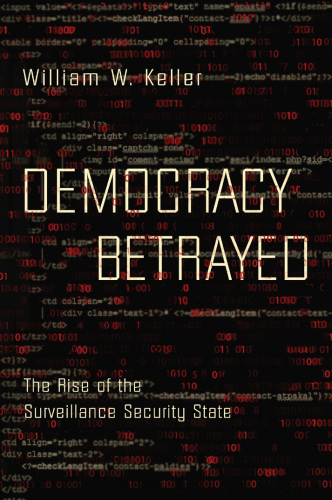
Democracy Betrayed
The Rise of the Surveillance Security State
کتاب های مرتبط
- اطلاعات
- نقد و بررسی
- دیدگاه کاربران
نقد و بررسی

October 24, 2016
Readers of similarly themed books, such as James Risen’s outstanding Pay Any Price: Greed, Power, and Endless War, will find little new information or analysis here. Keller (The Liberals and J. Edgar Hoover), former director of the Center for International Trade and Security at the University of Georgia, offers a familiar thesis: that the post-9/11 steps taken to ensure homeland security have instead threatened Americans’ liberties. Keller correctly notes that the odds of an American falling victim to a terrorist attack are much smaller than is often perceived, but his arguments discount the fears the prospect of such attacks understandably engender. As a consequence, his warnings about the assault on privacy and civil liberties will be viewed as tone-deaf by those not already persuaded of his central premise. Keller writes as if he invented the term “the Security Industrial Complex,” though that phrase, riffing on President Eisenhower’s phrase “the military-industrial complex,” dates back to at least 2004; the suggestion that he is pioneering arguments pervades the book. He concludes with the laudable aspiration that the “great arc of history” not record “the demise of the open society,” but without affording a plausible case that government intrusion into private lives will be reduced anytime soon.

November 1, 2016
"Liberty must always be privileged over security": a persuasive cri de coeur from a national security expert.Is the West at war with Islam? Is the United States at war with "radical Islamic terrorism," the claim on which Ted Cruz staked his bid for the presidency? In a sense, sure, and there are tangible threats to the security of ordinary people in this time of conflict. Still, Keller (International Affairs/Univ. of Georgia; The Liberals and J. Edgar Hoover: Rise and Fall of a Domestic Intelligence State, 2016, etc.) notes, there is a greater existential threat in the constant ploys by "politicians and the intelligence agencies...[to] instill irrational fear into the hearts and minds of ordinary citizens." There are payoffs to doing so, of course. By the author's account, a narrative of daily life in which terrorism is a permanent presence and threat helps "politicians and security chiefs maintain and increase power," even if it flies in the face of the evidence, which instead suggests that we're more likely to be victims of ordinary citizen-on-citizen homicide, to say nothing of lightning strikes, car wrecks, and other accidents. Keller charts the growth of what he calls "Secure Democracy," a security state with the outward trappings of a free society but one that, since 9/11, has been ever more intrusive and manipulative, especially in the misrepresentation of facts concerning the dangers of terrorism. The author likens the expansion of this security state to the expansion of the nuclear arsenal during the Cold War. If it was a given that some nuclear weaponry was required as a deterrent, the stockpiles that both the U.S. and the Soviet Union accumulated were far beyond what was necessary--an "exercise in the absurd," writes the author, though there is nothing absurd in the "pseudo-democratic governance" that has replaced the old republic. Though without the rhetorical fire of Noam Chomsky or Naomi Klein, Keller makes a spirited case for preferring untrammeled freedom to managed and monitored safety.
COPYRIGHT(2016) Kirkus Reviews, ALL RIGHTS RESERVED.

























دیدگاه کاربران